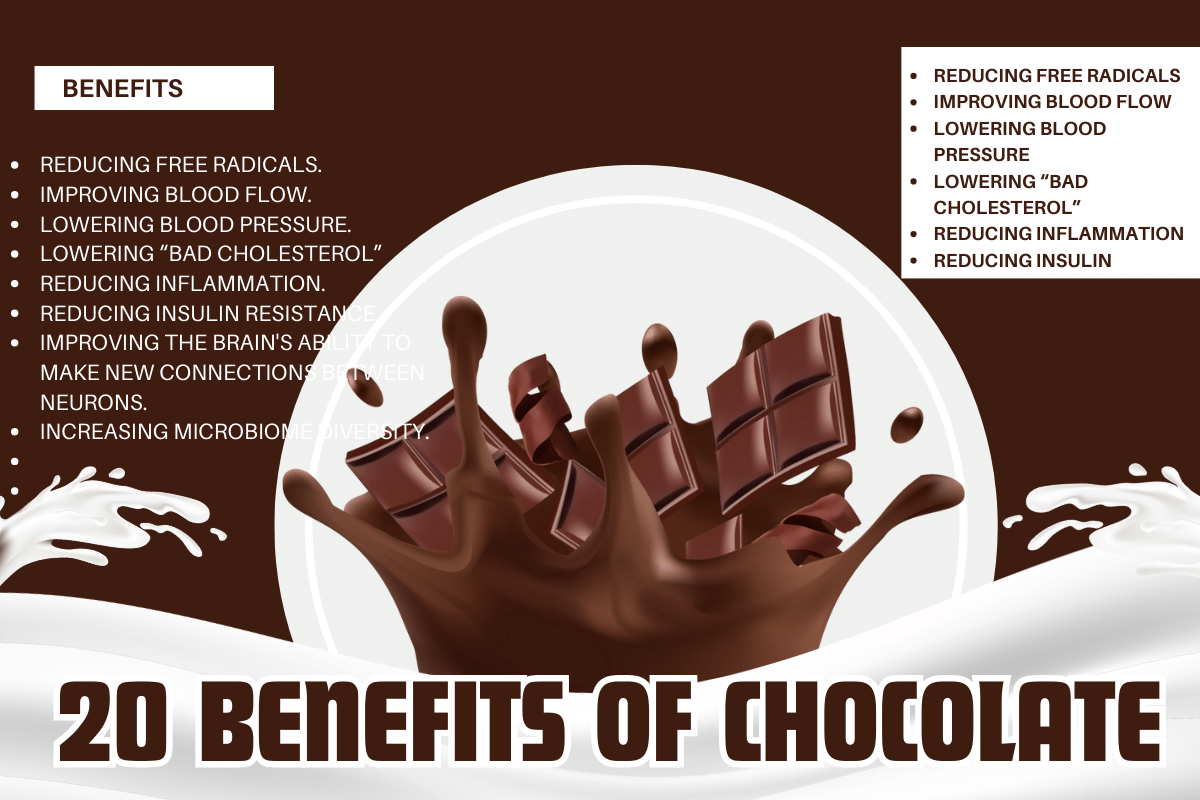Chocolate, particularly dark chocolate derived from cacao, is renowned for its numerous health benefits owing to its rich content of essential minerals such as iron, magnesium, and zinc. These minerals play a crucial role in supporting overall well-being. Additionally, the potent antioxidants found in dark chocolate contribute to reducing inflammation and decreasing the risk of heart disease. Unlike commercial milk chocolate, which contains added ingredients like cocoa butter, sugar, and milk in small quantities, dark chocolate contains larger amounts of cacao, intensifying its positive impact on health. This article will explore the potential health benefits of dark chocolate, providing nutritional information, while also addressing risks and considerations to guide individuals on how much to eat for optimal health.
Benefits of Dark Chocolate for Health
Indulging in dark chocolate can be a delightful way to harness a multitude of beneficial compounds. Rich in flavanols, polyphenols, and theobromine, dark chocolate stands out due to its minimally processed nature, preserving the most beneficial compounds present in cocoa.
Unlike chocolates altered by extensive manufacturing processes that may add ingredients like cocoa butter, sugar, and milk, dark chocolate, with a higher percentage of cocoa, offers a larger amount of essential nutrients directly from the cacao plant. Embracing dark chocolate can contribute to various health benefits, including reducing free radicals, improving blood flow, lowering blood pressure, and reducing inflammation. Moreover, it may enhance the brain’s ability to make new connections between neurons and promote increased microbiome diversity, making it a scrumptious and health-conscious choice.
Antioxidants: The Power of Dark Chocolate
Dark chocolate is a treasure trove of natural goodness, boasting essential compounds like flavanols and polyphenols that pack a punch in the realm of antioxidant properties. These mighty antioxidants play a vital role in our well-being by working to neutralize harmful free radicals and thwart oxidative stress, a process that can lead to damage in the cells and tissues throughout the body when left unchecked.
As we age, the body experiences a natural wear and tear, known as the natural aging process, which can amplify the effects of oxidative stress. This, in turn, may contribute to the development of various diseases, including heart disease, diabetes, Parkinson’s disease, Alzheimer’s disease, cancer, and eye diseases. Embracing the antioxidant-rich qualities of dark chocolate becomes a delightful and accessible way to counteract these effects, promoting overall well-being simply and deliciously.
Heart Disease Risk: The Role of Dark Chocolate
Including dark chocolate in your diet may be a simple and enjoyable way to help reduce the likelihood of developing heart disease. The key lies in its rich content of beneficial compounds, particularly flavanols, which have the potential to positively affect two major risk factors associated with heart health: high blood pressure and high cholesterol. By incorporating dark chocolate into your eating habits, you can actively discuss and explore its potential benefits in addressing these two critical risk factors and, in turn, enhancing your cardiovascular well-being. So, indulge in moderation and savor the potential heart-protective qualities of this delightful treat.
Blood Pressure Benefits of Dark Chocolate
Flavanols in dark chocolate stimulate nitric oxide production, causing blood vessels to dilate and improve blood flow, effectively lowering blood pressure. In a study with 60 participants with type 2 diabetes and high blood pressure, those who consumed 25g of dark chocolate daily for 8 weeks saw significantly lower blood pressure compared to those having white chocolate. Additionally, a 2017 review highlights more significant blood pressure benefits in older individuals at higher cardiovascular risk compared to younger, healthier individuals. Enjoying dark chocolate in moderation could be a sweet and simple way to support heart health.
Heart-Healthy Dark Chocolate
Enjoying dark chocolate can benefit your heart by containing compounds like polyphenols and theobromine that help lower “bad cholesterol” (LDL) levels while increasing “good cholesterol” (HDL).
This delicious treat promotes heart health by preventing the narrowing of blood vessels and reducing the overall amount of cholesterol in the blood. In a 2017 study, adding dark chocolate and almonds to a typical American diet was shown to lower the risk of coronary heart disease by decreasing the presence of damaging small, dense LDL particles. So, savoring dark chocolate can be a tasty way to support a healthy heart.
Anti-inflammatory Effects of Dark Chocolate
In a small 2018 study, researchers found that eating 30g of 84% dark chocolate daily for 8 weeks significantly reduced inflammatory biomarkers in individuals with type 2 diabetes. The authors concluded that more studies are needed to evaluate the optimal amounts of dark chocolate for treating diabetes. A 2017 review published in Frontiers in Immunology highlighted that eating chocolate may influence the gut microbiome, potentially encouraging anti-inflammatory activity. While studies on animals show promise, more human studies are needed to better understand this effect.
Inflammation is a natural part of the body’s immune response to combat germs and harmful substances. However, chronic inflammation can lead to damage in cells and tissues, increasing the risk of various health conditions such as type 2 diabetes, arthritis, and certain types of cancer. Dark chocolate, with its compounds and anti-inflammatory properties, may offer a simple and delicious way to help reduce inflammation in the body.
Insulin Resistance and Dark Chocolate
Insulin resistance happens when the body’s cells stop responding effectively to the hormone insulin, resulting in abnormally high levels of blood glucose that can lead to conditions like prediabetes and type 2 diabetes. In a 6-month study in 2018 that examined the relationship between regular dark chocolate consumption and blood glucose levels in Hispanic individuals, the research findings suggested that eating 48g of 70% dark chocolate each day could help lower fasting glucose levels and reduce insulin resistance.
This indicates that incorporating moderate amounts of dark chocolate into one’s diet might offer a sweet strategy to support better blood sugar control and insulin sensitivity.
Brain Function Boost with Dark Chocolate
Eating dark chocolate may not only be a delightful treat but also an ally in improving brain function and potentially helping prevent neurodegenerative conditions like Alzheimer’s and Parkinson’s diseases. A small 2018 study suggests that the flavanols present in dark chocolate could enhance neuroplasticity, the brain’s ability to reorganize itself, particularly in response to injury or disease. Another study in 2016 identified a positive association between regular chocolate consumption and cognitive performance. However, as the findings relied on self-reported chocolate intake, researchers were unable to draw definitive conclusions. While more research is needed, these initial insights hint at the delicious possibility that dark chocolate might contribute to a healthier brain.
Microbiome Diversity: Dark Chocolate’s Impact
Eating dark chocolate not only satisfies your sweet cravings but may also benefit your gut microbiome, aiding in digestion. A 2022 South Korean study published in The Journal of Nutritional Biochemistry discovered that eating dark chocolate is associated with increased diversity in the gut microbiome. The results suggest a positive correlation between eating 85% dark chocolate and mood. Researchers attributed this benefit to the increased diversity in the microbiome, indicating a potential link between gut health and mood through the gut-brain axis. So, indulging in a bit of dark chocolate might not only be a treat for your taste buds but also a boost for your gut health.
Risks and Considerations: Flavanols in Dark Chocolate
The health benefits of dark chocolate are primarily attributed to the presence of flavanols in cacao solids. However, it’s crucial to note that the flavanol content can vary among different dark chocolate products due to varying processing methods employed by manufacturers.
Flavanols and Legal Considerations
There is currently no legal requirement for chocolate manufacturers to report the flavanol content in their products. Dark chocolate products with a higher percentage of cacao solids generally contain more flavanols. This lack of regulation makes it challenging for consumers to make informed choices about the flavanol content in the dark chocolate they consume.
Nutritional Considerations: Calories and Fats
While dark chocolate contains beneficial antioxidants and minerals, it is also high in sugar and fat, making it a calorie-dense food. The fat in dark chocolate is mainly in the form of cocoa butter, which consists of unhealthful saturated fats. Individuals who aim to maintain a healthy diet should be cautious about limiting their consumption of dark chocolate to avoid excessive calorie and fat intake.
Heavy Metals and Product Safety
A recent article by Consumer Reports highlighted concerns about heavy metals in dark chocolate. Testing popular dark chocolate products, they found that many contain high levels of lead and cadmium, substances that naturally occur in cacao. To make informed choices, consumers should consider opting for dark chocolate brands known for product safety. According to the report, some of the safest dark chocolate brands in 2022 include Ghirardelli, Mast, Taza, and Valrhona.
How Much You Can Eat Per Day?
When considering how much to eat of dark chocolate, choosing varieties with higher percentages of cacao solids is key. This type of dark chocolate typically contains less sugar and more fat, but it also means there’s a higher concentration of flavanols, contributing to potential health benefits. It’s advisable to opt for dark chocolate that includes at least 70 percent cacao solids to ensure a significant flavanol content. While some studies and articles suggest a daily consumption of about 20–30g of dark chocolate, it’s important to note that chocolate manufacturers are not required to report flavanol content, making it difficult for individuals to know how much they would need to eat to maximize the potential health benefits.
Conclusion
dark chocolate emerges as a delightful treat packed with goodness. A rich source of antioxidants and minerals, it generally contains less sugar compared to milk chocolate. Research suggests that incorporating dark chocolate into your diet may help lower the risk of heart disease, reduce inflammation and insulin resistance, and even increase the diversity of the gut microbiome, ultimately contributing to improved brain function. For those interested in adding dark chocolate to their diet, it’s essential to keep in mind that while it offers these potential benefits, it is also high in fat and calories. Moderation is the key to relishing the sweet pleasures of dark chocolate while maintaining a balanced and health-conscious approach to consumption.
FAQs
It may help improve your memory as you get older.
Dark chocolate flavanols may enhance brain function.
Can dark chocolate put you in a better mood?
The antioxidants in dark chocolate can positively affect mood.
It may help lower cholesterol levels.
Consuming dark chocolate may contribute to lower cholesterol.
It may help people with Alzheimer’s disease.
The flavanols in dark chocolate could have potential benefits for Alzheimer’s.
It can help you with your workout.
Dark chocolate may be a source of energy for workouts.
It can help to lower your blood pressure.
Dark chocolate flavanols may contribute to lower blood pressure.
Dark Chocolate helps you produce more endorphins.
Dark chocolate consumption may stimulate endorphin production.
Chocolate may reduce pregnancy complications.
The antioxidants in dark chocolate may contribute to reducing complications in pregnancy.
Can Chocolate help your heart to stay healthy?
Dark chocolate’s potential benefits may contribute to heart health.
Is it very nutritious?
Dark chocolate, with its flavonols, is considered a nutritious option.
Can Chocolate make you better at math?
The positive effects of dark chocolate on brain function could potentially aid cognitive skills.
How Can You Balance Your Life?
A balanced life involves mindful consumption of dark chocolate along with other healthy choices.
Can I Eat Dark Chocolate Every Day?
Yes, in moderation (around 20-30g), dark chocolate may offer health benefits, but be mindful of its calorie content
Are There Any Disadvantages of Eating Dark Chocolate?
Dark chocolate, though beneficial, can be high in calories and fats, and some products may contain heavy metals.
How Do I Choose and Store Dark Chocolate?
Opt for varieties with at least 70% cacao solids, and store them in a cool, dry place away from sunlight and odors.
Read More About



